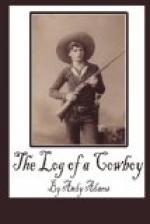We reached the wagon in good time to be called on our guard, and after it was over secured a few hours’ sleep before the foreman aroused us in the morning. With herds above and below us, we would either have to graze contrary to our course or cross the river. The South Platte was a wide, sandy river with numerous channels, and as easily crossed as an alkali flat of equal width, so far as water was concerned. The sun was not an hour high when we crossed, passing within two hundred yards of the business section of the town, which lay under a hill. The valley on the north side of the river, and beyond the railroad, was not over half a mile wide, and as we angled across it, the town seemed as dead as those that slept in the graveyard on the first hill beside the trail.
Finding good grass about a mile farther on, we threw the herd off the trail, and leaving orders to graze until noon, the foreman with the first and second guard returned to town. It was only about ten miles over to the North Platte, where water was certain; and in the hope that we would be permitted to revisit the village during the afternoon, we who were on guard threw riders in the lead of the grazing cattle, in order not to be too far away should permission be granted us. That was a long morning for us of the third and fourth guards, with nothing to do but let the cattle feed, while easy money itched in our pockets. Behind us lay Ogalalla—and our craft did dearly love to break the monotony of our work by getting into town. But by the middle of the forenoon, the wagon and saddle horses overtook us, and ordering McCann into camp a scant mile in our lead, we allowed the cattle to lie down, they having grazed to contentment. Leaving two men on guard, the remainder of us rode in to the wagon, and lightened with an hour’s sleep in its shade the time which hung heavy on our hands. We were aroused by our horse wrangler, who had sighted a cavalcade down the trail, which, from the color of their horses, he knew




